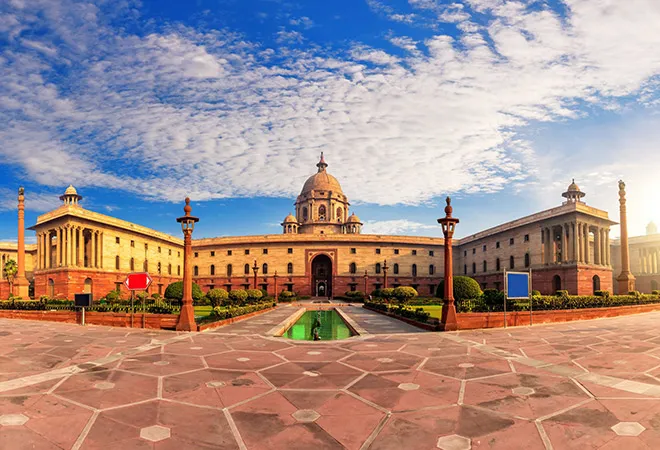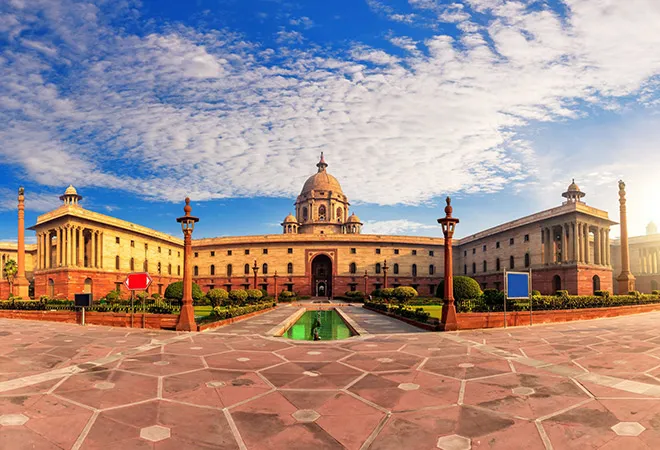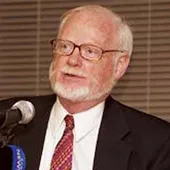 This piece is part of the series, India @75: Assessing Key Institutions of Indian Democracy.
This piece is part of the series, India @75: Assessing Key Institutions of Indian Democracy.
For most of the last 75 years, India’s Presidents have seldom been entangled in controversy. Controversies are highly unlikely during the Presidency of Draupadi Murmu who has just been elected, but her remarkable
record suggests that there is a small chance that disagreements with ministers may emerge during her five years in office.
The role of the President
The president serves as the head of state and gives assent to the formal actions of Indian governments. Though they do not enjoy the same level of power that is extended to the head of the government, they nonetheless can control certain aspects of governance. Presidents are required by the Constitution to act on ministerial advice. They have the power to advise ministers and can send a bill (which is not a money bill), back for reconsideration, however, they are bound to give way if they resend the bill for presidential assent.
Ms Murmu was not a ‘rubber stamp’ governor. This suggests the possibility—though very remote—that, as the President, she might take similar action. She is said to be a resolute person with an independent mind who pays close attention to details.
At certain
times, however, presidents do not (or at least might not) act on the advice of ministers. First, after a national election, they must decide whom to invite to form a government. If no party or alliance has a clear majority, the President’s decision may not be widely accepted. Second, when ruling parties no longer enjoy a clear majority, presidents may ask them to test their strength in the Lok Sabha, or they may invite a new leader to form a government. Those decisions inevitably lead to disputes. Third, if a prime minister advises the president to dissolve the Parliament before the end of its term to ensure a snap election, a President might end up creating a controversy either by refusing (that has not yet happened in India) or by agreeing even when the request appears to be unwarranted to many.
Controversial past
Presidents’ interactions with ministers are influenced by the strength in the Parliament of ruling parties or alliances. At most times, since 1950, Prime Ministers have had solid majority support. That was true until 1989 when the Congress Party was the most powerful political force, and after 2014, when the Bharatiya Janata Party (BJP) was firmly in command of the Lok Sabha. It was also largely true between 2004 and 2014 when Congress and its allies had majority support. In those periods, presidents usually accepted prime ministers’ decisions—although there were, as we shall see, exceptions.
But between 1989 and 2004—and briefly, when the Janata government unravelled in 1979—no party or alliance enjoyed a dominant position in Parliament. That created the possibility that presidents might become enmeshed in controversial disagreements with prime ministers and major parties, even if they sought to avoid that.
During those periods, presidents’ independent actions caused major controversy only once in 1979. First, when factional battles were destabilising the ruling Janata Party, President Neelam Sanjiva Reddy invited strong criticism for summoning Charan Singh to form a government at a time when other leaders seemed to be more plausible candidates. President Reddy created further outrage by adhering to Charan Singh’s request for dissolving the Parliament—even though Charan Singh appeared to not have the authority to ask this because he was unable to garner a majority in the Lok Sabha.
The President refused to clear the content of an Independence Day speech with the Prime Minister, as was customary but not legally required.
Less acute controversies came up in the period between 1989 and 2004 when the presidents had the chance to act more assertively. Most presidents restrained themselves, but others exhibited greater proactiveness—most notably K.R. Narayanan (President 1997-2002). He stirred controversy in 1998 by asking the I.K. Gujral government to reconsider a request to impose the president’s rule in Uttar Pradesh. He was legally entitled to question that decision, and the Gujral government dropped the proposal—partly because its grip on power was tenuous, and partly because there was widespread discontent with successive government’s abuse of the president’s rule.
Narayanan continued to assert himself after the 1998 national election when a coalition government headed by Atal Behari Vajpayee took power, again without firm majority support. The President refused to clear the content of an Independence Day speech with the Prime Minister, as was customary but not legally required. Then in 1999, he asked Vajpayee to prove that his majority in the Lok Sabha. Most other presidents have cautiously not indulged in such actions, however, disagreements have rather quietly surfaced under several presidents over the mercy petitions.
Disputes between presidents and prime ministers have also occurred when ruling parties or alliances have reliable parliamentary majorities. Rajendra Prasad (President 1952-1962) tried three times to prevail over Jawaharlal Nehru. On the first two occasions, the matter attracted only limited public attention and Nehru prevailed, although he had to threaten to resign. In the third instance, Prasad challenged Nehru openly and—in an action which firmly established the primacy of prime ministers—he was sharply rebuffed and gave way after Nehru threatened to send the matter to the Supreme Court.
The latter disapproved of a postal bill that the government had passed. President Zail Singh felt that by permitting the central and state governments to intercept, inspect, detain, or dispose of any items in the post that were perceived to jeopardise national security, the bill was impinging upon the fundamental freedoms of the citizens.
Then in the late 1980s, there was a personal rift between Rajiv Gandhi whose government had a four-fifths majority in Parliament and Giani Zail Singh (President 1982-1987). The latter disapproved of a postal bill that the government had passed. President Zail Singh felt that by permitting the central and state governments to intercept, inspect, detain, or dispose of any items in the post that were perceived to jeopardise national security, the bill was impinging upon the fundamental freedoms of the citizens.
Zail Singh tried something new. He withheld assent from the bill without sending it back to ministers. That denied the Prime Minister the chance to reiterate support for the bill, which would have forced the President’s hand. As a result of this innovative tactic—which is often called a ‘pocket veto’—the bill was shelved. It might have created serious

but since this was a case of
inaction, it attracted only limited public attention. After the 1989 election brought a non-Congress government to power, Ramaswamy Venkataraman (President, 1987-1992), who also disapproved of the postal bill, continued to exercise that ‘pocket veto’ and the bill quietly died.
A serious constitutional crisis would arise if a president further refuses to give assent after the Council of Ministers has reiterated its advice. This has never happened, although Rajendra Prasad’s dispute with Nehru came close, and it remains highly unlikely. But in an interview after his retirement, Venkataraman raised the prospect of this once again. He stated that if a president is asked to act against the Constitution, even the ministers’ reiterated advice may not be binding upon the President. Therein lies the political dynamite.
Past controversies between presidents and prime ministers are worth recalling now because in 2017, as Governor of Jharkhand (2017-2021), Draupadi Murmu objected to a bill brought before her by the BJP-led state government. The bill amended two existing laws, and in her view, it undermined Scheduled Tribes’ rights by making their lands available for commercial use. She sent the bill back to ministers, asking publicly how it could benefit tribal welfare. This step had put the BJP-run Jharkhand government in an embarrassing situation, especially because it is a heavily tribal state, and therefore. the bill was dropped.
The bill amended two existing laws, and in her view, it undermined Scheduled Tribes’ rights by making their lands available for commercial use.
In that instance, Ms Murmu was not a ‘rubber stamp’ governor. This suggests the possibility—though very remote—that, as the President, she might take similar action. She is said to be a resolute person with an independent mind who pays close attention to details, but she has also been a loyal BJP leader who has exercised substantial power within the party in its efforts to mobilise tribal support. So, it is probably extremely unlikely that disputes with Union ministers will arise. She might have objected to very recent decisions by the government to revise the Forest Conservation Rules to the disadvantage of forest dwellers including many tribals. Perhaps it was a calculated move which was taken right
before she was elected as President.
The views expressed above belong to the author(s). ORF research and analyses now available on Telegram! Click here to access our curated content — blogs, longforms and interviews.



 This piece is part of the series,
This piece is part of the series, 
 PREV
PREV


